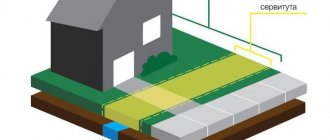An easement is established to ensure passage and passage through a neighboring land plot, the laying and operation of power lines, communications and pipelines, provision of water supply and land reclamation, as well as other needs of the owner of real estate that cannot be provided without the establishment of an easement.
The establishment of a private easement is necessary to ensure access and meet the needs of the property owner, if this is impossible to do otherwise. At the same time, this can be done either voluntarily, by concluding an easement agreement or, in case of a dispute, by a court decision.
The rules on easement are scattered across various branches of law, which creates additional difficulties in an already complex topic. Therefore, their removal is carried out by the court. In this regard, for analysis we will take judicial acts.
After analyzing judicial practice, we can identify certain approaches to solving various types of problems encountered in life. We will talk only about private easements and for consideration we examined, in addition to the decisions of the Presidium of the Supreme Arbitration Court of the Russian Federation, the practice of our native region, namely the cases that reached the cassation of the West Siberian District.
Let's look at the most common issues that arise in courts regarding claims for the establishment of easements.
What parameters can be taken into account when calculating the cost of an easement?
In accordance with Part 5 of Art.
23 of the Land Code of the Russian Federation, the easement must be the least burdensome for the site in respect of which it is established. Accordingly, when calculating the cost, all costs can be taken into account, as well as the possible benefits from its use if the site were not burdened with an easement. The Ministry of Economic Development of the Russian Federation, in its letter dated November 3, 2009 No. D23-3607, indicated that “the proportionality of the payment for the use of a land plot represents its compliance with the inconveniences and restrictions that the owner of the land plot experiences in connection with the use of his plot by the holder of the easement.”
The Supreme Arbitration Court of the Russian Federation, in its Resolution No. 11248/11 of February 28, 2012 in case No. A45-12892/2010, explained exactly what parameters can be included in the cost of the easement, namely:
1. Material benefit that the owner of the encumbered plot could receive if he were free from the easement, for example, in the form of rent;
2. The nature and intensity of use of the site by the person in whose favor the easement is established;
3. Expenses of the owner of the encumbered plot to ensure the implementation of the right of the easement holder, for example, to organize and ensure a security and access regime, maintaining the road surface in proper condition, etc.
The Ministry of Economic Development of the Russian Federation, in turn, pointed out the possibility of establishing a fee based on an assessment report made in accordance with Law No. 135-FZ of July 29, 2009 “On appraisal activities in the Russian Federation.” This means that all of the above costs can be determined at current market prices. However, it should be borne in mind that this letter is purely advisory in nature and may or may not be taken into account by the court.
Article 274. The right to limited use of someone else’s land plot (easement)
Article 274. The right to limited use of someone else’s land plot (easement)
[Civil Code] [Civil Code of the Russian Federation, Part 1] [Section II] [Chapter 17]
. The owner of real estate (land, other real estate) has the right to demand from the owner of a neighboring land plot, and, if necessary, from the owner of another land plot (adjacent plot), to grant the right to limited use of the neighboring plot (easement).
An easement may be established to ensure passage and passage through a neighboring land plot, construction, reconstruction and (or) operation of linear objects that do not interfere with the use of the land plot in accordance with the permitted use, as well as other needs of the owner of real estate that cannot be provided without establishing easement.
. Encumbering a land plot with an easement does not deprive the owner of the plot of the rights of ownership, use and disposal of this plot.
. An easement is established by agreement between the person requiring the establishment of an easement and the owner of the neighboring plot and is subject to registration in the manner established for the registration of rights to real estate. If no agreement is reached on the establishment or conditions of the easement, the dispute is resolved by the court at the request of the person demanding the establishment of the easement.
. Under the conditions and in the manner provided for in paragraphs 1 and 3 of this article, an easement may also be established in the interests and at the request of the person to whom the plot is provided with the right of lifelong inheritable possession or the right of permanent (perpetual) use, and other persons in cases provided for by federal law. laws.
. The owner of a plot of land encumbered by an easement has the right, unless otherwise provided by law, to demand from the persons in whose interests the easement is established a proportionate payment for the use of the plot.
. In cases provided for by law, an easement is established by agreement between the person requiring the establishment of the easement and the person to whom the land plot is in state or municipal ownership, if this is permitted by land legislation. In this case, the rules provided for by this article and Articles 275, 276 of this Code for the owner of such a land plot are applied to the person who is provided with a land plot in respect of which an easement is established.
Who should be involved when considering the possibility of developing alternative passage options?
In addition to the fact that the court can involve persons with special knowledge in various fields, it is necessary not to forget about the owners of neighboring land plots.
The fact is that when considering, for example, alternative options for travel through other areas, it is necessary to take into account the rights of these owners and involve them in the consideration of the case, otherwise the case may be sent for a new trial (Resolution of the Arbitration Court of the West Siberian District dated 08.08.2014 in case No. A70 -11384/2013).
Customer Reviews
Review by Minina M.V. I would like to express my deep gratitude to Yuri Vladimirovich Sukhovarov for his competent advice and qualified assistance on my issue.
With gratitude, Minina Margarita Vladimirovna.
Gratitude to Konstantin Vasilievich Solovyov I am very glad that I was accepted for a consultation with Konstantin Vasilievich Solovyov. An excellent, very competent lawyer. Please accept my gratitude for your excellent service. Thank you!
Valadze G.G. 08/17/2018
Gratitude from gr. Bogodyazh N.G. I, Bogodyazh N.G. turned to the Legal Agency of St. Petersburg for help in a dispute with the company RTC JSC regarding the refusal to return the goods in accordance with the rules of trade, thereby my consumer rights were violated.
Thanks to the company’s lawyer, Stepanov D.Yu., I was able to return the money for the low-quality product, and I also received an apology from my opponent. I would like to express my gratitude for the qualified assistance provided to me by D. Yu. Stepanov and the Legal Agency of St. Petersburg.
With gratitude, Bogodyazh.
Thanks to Stepanov D.Yu. from Shcherbakova T.I. I would like to express my deep gratitude to Denis Yuryevich Stepanov for the very competent, highly qualified handling of my difficult case of terminating a contractual agreement with a problematic developer, who repeatedly postponed the completion of construction and completely ignored our claims (from other legal companies). The claim and complaints of Denis Yuryevich put everything in its place quickly enough, saving us from the threat of penalties from the developer, who unlawfully included them in the contract. Good luck to you in defending our legitimate interests! Thank you!
Sincerely, Shcherbakova T.I. 04.12.2017
Gratitude to Pavlyuchenko I express my gratitude to Alexander Viktorovich Pavlyuchenko for the qualified management of my case, competent advice and informed decisions, which led to compensation for all claimed losses.
Best regards, Evgeny Nevinchany
Gratitude from Bolotin V.S. I thank Alexander Viktorovich Pavlyuchenko for the work done as part of the investigation into the administrative case. I am especially grateful that almost all activities within the framework of the case were carried out by Alexander personally, without my involvement, which significantly saved my time. I would also like to note the efficiency with which the work was completed. I would like to wish Alexander further success in his professional activities and the successful completion of all current and subsequent cases, restoring justice to his clients.
Bolotin V.S., 02/12/2017
Gratitude from Piskunov I.B. I just don’t have words to express my gratitude to Sergei Vyacheslavovich. Thank you for having such a lawyer. Thank you for your help regarding the issue regarding the employment contract.
Piskunov I.B. 12/12/2018
Gratitude to Sukhovarov I, Dmitry Vladimirovich Korchagin, express my gratitude and appreciation to lawyer Yuri Vladimirovich Sukhovarov for high-quality and qualified advice. Thank you.
Gratitude from N.A. Tomashpolskaya I would like to express my deep gratitude to Alexander Viktorovich Pavlyuchenko for his competent legal advice and sensitive, attentive attitude towards me, who found myself in a difficult situation.
Sincerely, Tomashpolskaya N.A. 07/01/18
Gratitude from Remedova A.G. I express my gratitude to the Legal Agency of St. Petersburg, namely Denis Yuryevich Stepanov, for the assistance provided in resolving my issue, and I also express my gratitude to the entire team of the consumer rights protection society for their responsiveness and pleasant communication.
Remedova A.G. 08/17/2018
What is included in the subject of proof in claims for the establishment of an easement?
Or does the plaintiff have to prove to the court that he is being prevented from using the neighboring plot? The Presidium of the Supreme Arbitration Court of the Russian Federation spoke unequivocally on this matter, noting that one should not confuse the requirements to stop violations of property rights not related to deprivation of possession (Article 304 of the Civil Code of the Russian Federation) with the requirements to establish an easement (Resolution of the Presidium of the Supreme Arbitration Court of the Russian Federation dated February 28, 2012 N 11248 /11 in case No. A45-12892/2010). These are different claims and their subjects of proof are, accordingly, different. As a conclusion, I note that more complete legislative regulation could remove some of the identified problems, but for now the courts have to do this.
Differences in setting fees for public and “private” easements
When determining the fee for an easement, what matters is whether the easement is public or “private.”
Establishing the amount of payment for a “private” easement
Clause 5 Art. 274 of the Civil Code of the Russian Federation establishes that the owner of a plot encumbered with an easement has the right, unless otherwise provided by law, to demand from the persons in whose interests the easement is established a proportionate payment for the use of the plot.
Land legislation also establishes that the owner of a land plot encumbered with an easement has the right to demand proportionate payment from the persons in whose interests the easement is established, unless otherwise provided by federal laws. In cases where the establishment of a public easement leads to significant difficulties in the use of a land plot, its owner has the right to demand from the state authority or local government body that established the public easement a proportionate fee (clauses 6–7 of Article 23 of the Land Code of the Russian Federation).
Thus, the legislator gives the right, when establishing an easement, to establish a fee for the use of part of the land plot. At the same time, disputes often concern not so much the establishment of a fee for an easement, but rather its size.
The question of an algorithm or methodology for determining the size of the fee, especially in relation to urgent easements, remains open. It is not legally established how exactly the amount of the fee should be determined, with the exception of the requirement of proportionality to the interests of persons whose rights are limited. The amount of payment should be established adequately, and not based on the principles or harmfulness of the owner of the land plot burdened with the easement. It must really depend on the restrictions and inconveniences that the owners of the land undergo if an easement is established. If there is disagreement about the amount of the fee, the issue will need to be resolved in court, which will decide on the proportionality of the fee for the easement and the possibility of the least burden on the owner of the land plot.
Clause 12 of the Review of the Armed Forces of the Russian Federation states that the fee for an easement is determined based on the principles of reasonableness and proportionality, taking into account the nature of the parties’ activities, the area and period for establishing the easement, and can take the form of either a one-time payment or periodic payments. The amount of payment for the easement must be proportionate to the material benefit that the owner of the land plot acquires as a result of the establishment of the easement, compensating for the restrictions that the owner of the land plot burdened with the easement undergoes. The amount of the fee includes reasonable costs incurred by the owner of the property in connection with the restriction of his property rights or the creation of conditions for the implementation by the owner of the property, to ensure the use of which the easement has been established, of limited use rights (for example, related to the need to organize passage through the land owned by the owner). site, demolition or relocation of fences, subject to access control, maintaining part of the site in proper condition), as well as those arising in connection with the termination of existing obligations of the owner of the site, encumbered by the easement, to third parties. In this case, it is also necessary to take into account the share of the land plot limited by the easement in the total area of the land plot; term for establishing the easement; the scope of restrictions on the use of the land plot and the intensity of its intended use; the nature of the inconvenience experienced by the owner of the real estate encumbered by the easement; the degree of influence of the easement on the possibility of disposing of the land plot. When deciding on the nature of the payment for the easement (a one-time payment in full or periodic payments throughout the entire term of the easement), in order to best respect the balance of interests of the parties, it is necessary to take into account the specific conditions of use and the scope of the easement.
If, for example, there was an increase in the scope of restrictions on his rights, the number of uses of the land plot increased (there were several times more units of equipment, etc.), the terms of the easement may provide for a procedure for changing the fee. Each party has the right to apply to the court with a demand to change the amount of payment (increase or decrease) in the event of a change in the scope of restrictions on the rights of the owner of a land plot encumbered by an easement (clause 13 of the Review of the Armed Forces of the Russian Federation).






